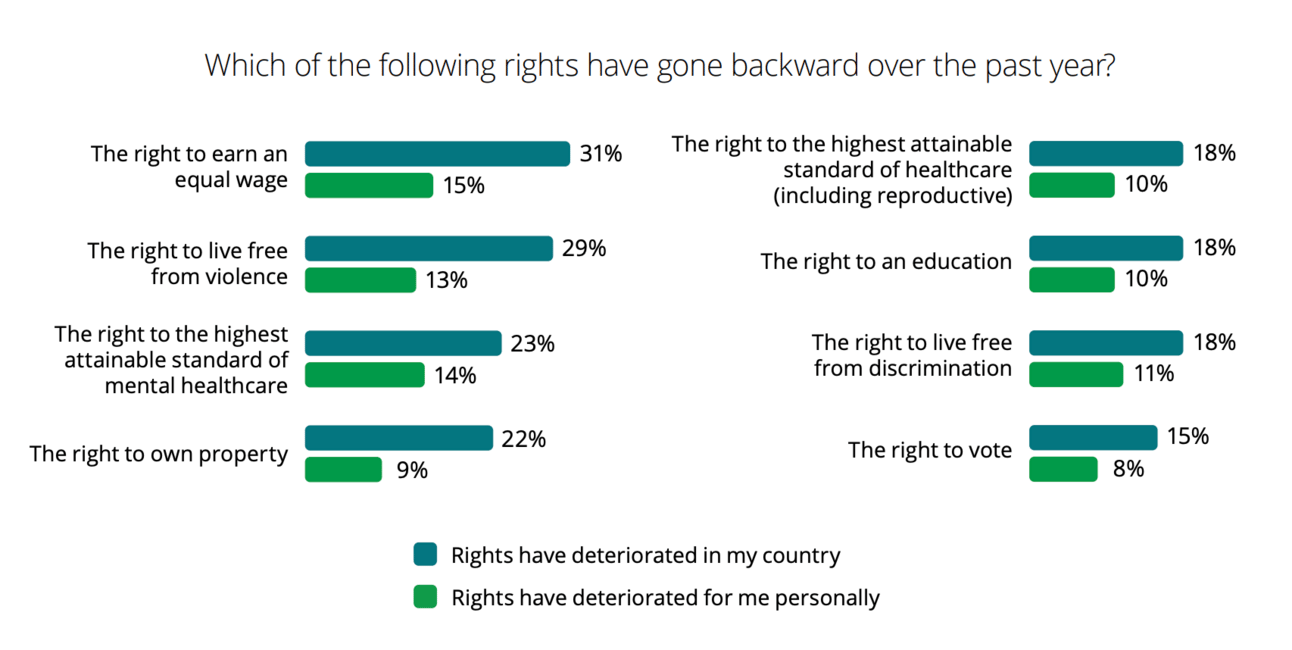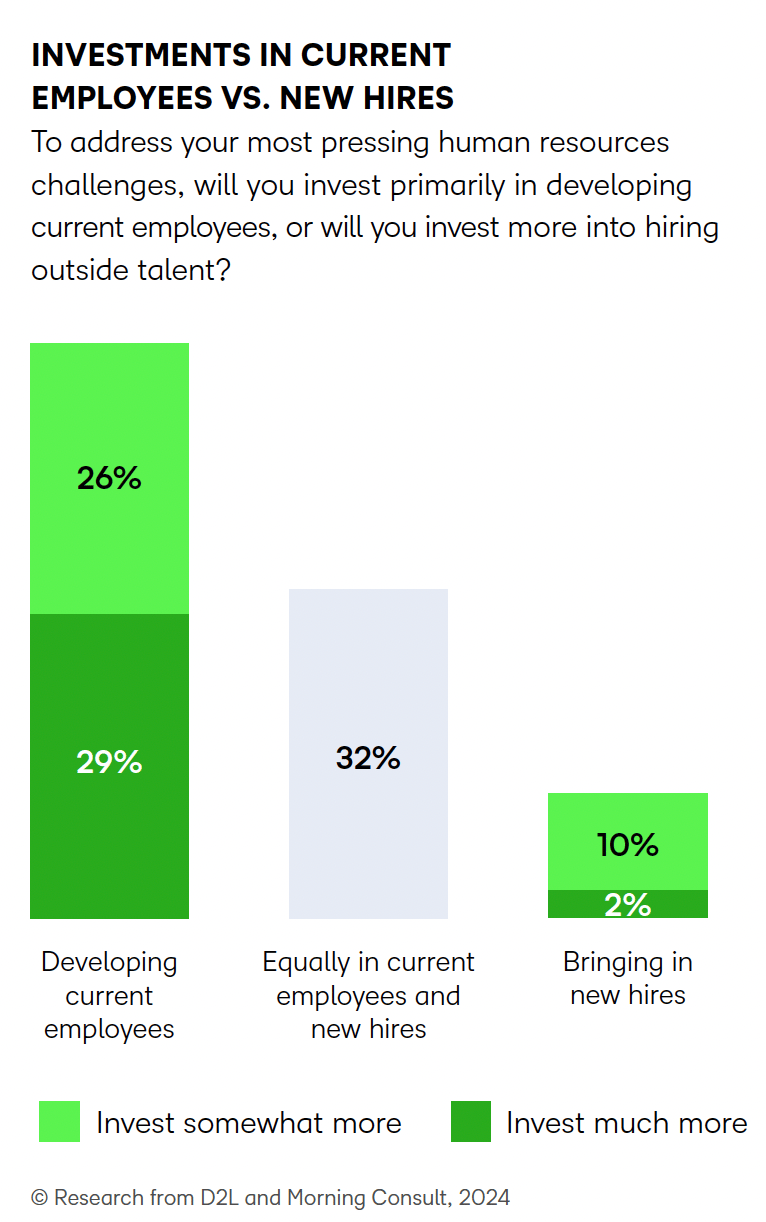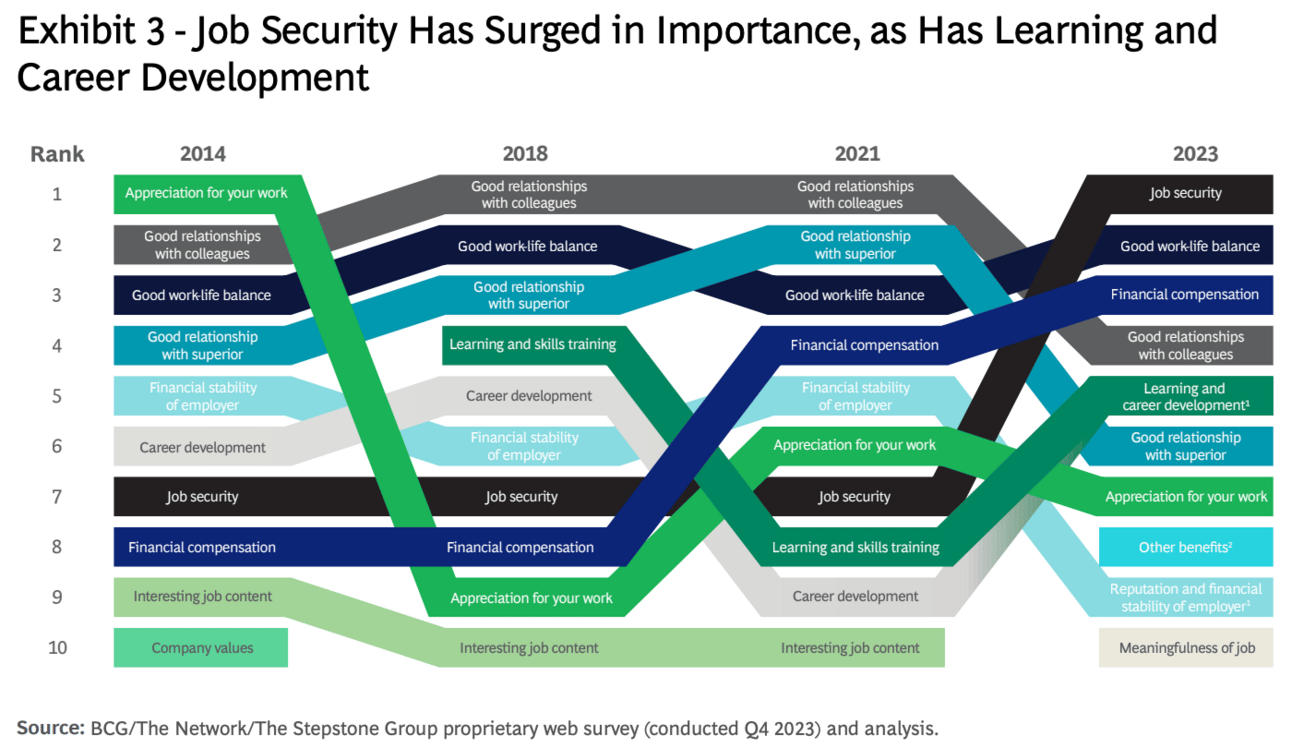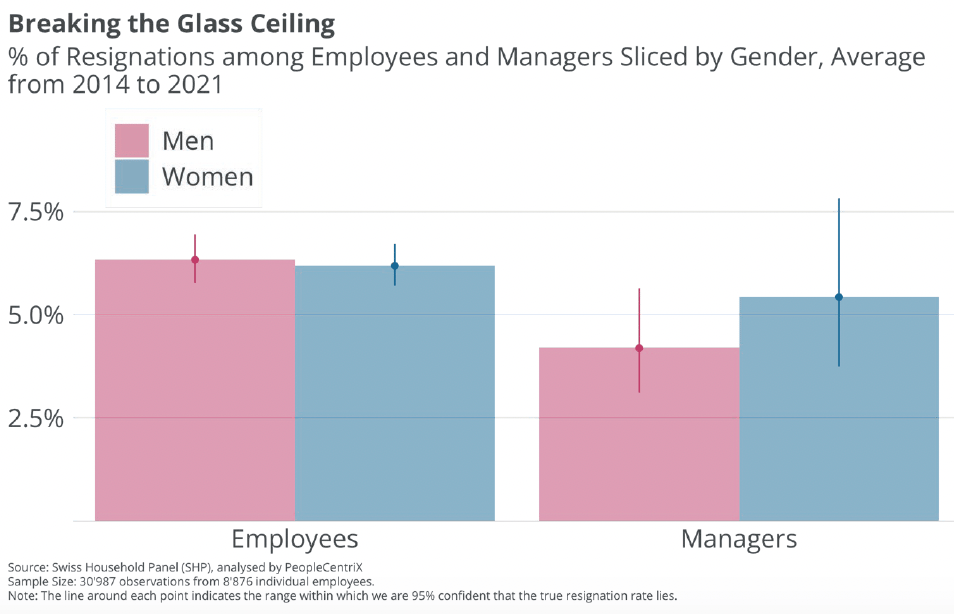- WeAreHuman@Work
- Posts
- WeAreHuman - Issue 001
WeAreHuman - Issue 001
WeAreHuman is a newsletter dedicated to fostering a more sustainable world of work.

THIS WEEK'S CONTENT
If you just want links and a brief description of the topics covered, you will find the information at-a-glance below. If you prefer a deeper dive, scroll down to the rest of the newsletter.
DIVERSITY, EQUITY & INCLUSION | Deloitte Insights | Women @ Work 2024 - A Global Outlook | The Deloitte’s Women@Work survey delves into the experiences of 5,000 women across 10 countries, examining their stress levels, safety worries, and mental health in the workplace.
EMPLOYABILITY & LEARNING CULTURE | D2L | Invest, Upskill, Excel | This report explores the importance of continuous learning and development in addressing recruitment, retention, and technological disruptions.
EMPLOYEE EXPECTATIONS | Boston Consulting Group | Decoding Global Talent 2024 - How Work Preferences Are Shifting in the Age of GenAI | This report provides an in-depth analysis of global workforce mobility and preferences, drawing insights from a survey of 150,000 individuals across 188 countries. This report highlights key trends and shifts in where and why people are willing to relocate for work.
RESPONSIBLE DEPLOYMENT OF AI & TECHNOLOGY | Jasmine Panayides | Ethical Considerations in Using AI for HR | This article discusses the ethical implications of using AI in HR, emphasizing privacy, data security, and bias prevention. It outlines the EU AI Act, which categorizes AI systems by risk and mandates strict compliance for high-risk applications.
SUSTAINABLE LEADERSHIP | PeopleCentriX | Unleashing Tomorrow’s Leaders: Navigating the Opportunities and Challenges in Leadership Succession, Diversity, and Success | This article discusses leadership trends, focusing on leadership succession, diversity, and the evolving expectations of both leaders and employees in the workplace, offering evidence-based strategies for navigating these challenges.
DIVERSITY, EQUITY & INCLUSION | Deloitte Insights | Women @ Work 2024 - A Global Outlook | The Deloitte’s Women@Work survey delves into the experiences of 5,000 women across 10 countries, examining their stress levels, safety worries, and mental health in the workplace.
DID YOU KNOW?
“More than one in 10 women think that women’s rights have deteriorated in their country in the last year”
DID YOU SEE?

NEED AN EXECUTIVE SUMMARY?
Mental Health and Stress
50% of women reported higher stress levels compared to the previous year.
67% of women feel uncomfortable discussing mental health at work, fearing negative career impacts.
20% of women worry that discussing mental health issues would damage their career progression.
Health Challenges
Over 27% of women face health challenges related to menstruation, menopause, or fertility.
40% of women experiencing high pain levels work through it without taking time off.
Only 19% of women felt supported by their employers when they disclosed menopause-related issues.
Work-Life Balance
50% of women with children take on the primary responsibility for childcare.
Nearly 60% of women involved in adult care take on the majority of these responsibilities.
Among primary earners, nearly 50% are still responsible for most childcare tasks.
Women with significant domestic responsibilities report lower mental well-being and job satisfaction.
Workplace Safety and Non-Inclusive Behaviors
Nearly 50% of women are worried about their safety at work or while commuting.
43% of women experienced non-inclusive behaviors, including microaggressions and harassment, in the past year.
More than 33% of women who experienced sexual harassment did not report it, often due to concerns about the severity of the behavior and fear of career damage.
Gender Equality and Leadership
Only 10% of women believe their employer is taking concrete steps toward gender equality.
Less than 25% see a gender-diverse leadership team at their organization.
Culture remains a significant barrier, with many women citing it as a reason for not pursuing leadership roles.
WANT THE COMPLETE STORY?
Access the source here.
EMPLOYABILITY & LEARNING CULTURE | D2L | Invest, Upskill, Excel | This report explores the importance of continuous learning and development in addressing recruitment, retention, and technological disruptions.
DID YOU KNOW?
“More than half of organizations (55%) prefer investing in the development of current employees over hiring new talent (12%)”
DID YOU SEE?

NEED AN EXECUTIVE SUMMARY?
Recruitment and Retention Challenges
82% of L&D leaders rank talent acquisition and retention as the most pressing human resources (HR) challenge.
92% of L&D leaders believe that effective training and development programs contribute to higher employee retention, supported by 77% of employees.
Investment in Workforce Development
55% of L&D leaders prefer investing more in developing current employees to address HR challenges, compared to only 12% who favor investing in new hires.
Employee engagement and productivity are also significant concerns, with 71% of L&D leaders highlighting these issues.
Technology and Learning Delivery
42% of employees prefer online education or training, yet only 29% of organizations use technology to deliver training, indicating a gap in meeting employee preferences.
Employee Perspectives on Skills Development
83% of employees recognize the importance of ongoing skills development for job performance.
Despite this, only 51% of employees have completed any formal education or training outside work in the past five years.
The primary motivators for pursuing additional education or training are increased earning potential (64%) and career advancement opportunities (44%).
Barriers to Training and Education
42% of employees cite time constraints as a major barrier to pursuing additional training or education.
Lack of motivation (35%) is another significant barrier, with 33% of employees seeking skills development only as needed.
Preferred Training Providers
41% of employees would look to their current employer for job- or industry-specific skills training, compared to 17% who would look to a community college and 14% who would seek a university.
WANT THE COMPLETE STORY?
Access the source here.
EMPLOYEE EXPECTATIONS | Boston Consulting Group | Decoding Global Talent 2024 - How Work Preferences Are Shifting in the Age of GenAI | A 36-page report on global trends in workers’ preferred ways of working, including their expectations of employers.
DID YOU KNOW?
“Job seekers are acutely aware of their value, with more than 60% believing they have the upper hand in labor market negotiations”.
DID YOU SEE?

NEED AN EXECUTIVE SUMMARY?
Talent as a Critical Resource: Despite technological, geopolitical, and demographic disruptions, talent remains scarce. Low unemployment rates and talent shortages underscore the importance of understanding workforce preferences.
Job Seekers' Confidence: Over 60% of job seekers feel they have the upper hand in labor market negotiations, reflecting strong confidence in their value.
Importance of Job Security and Development: Workers increasingly seek jobs that offer security and opportunities for learning and development, alongside traditional priorities like work-life balance, financial compensation, and workplace relationships.
Adoption of GenAI: Nearly 40% of workers regularly use GenAI tools for significant tasks, with higher adoption rates in emerging economies. This reflects a growing acceptance and utilization of AI technologies in the workplace.
Reskilling Needs: While only 5% of workers fear job replacement by GenAI, 60% expect to need significant reskilling. Many workers require guidance on which skills to develop to remain competitive.
Employer Strategies: To attract and retain talent, employers must offer robust reskilling programs, anticipate technological impacts, and foster value-driven cultures. Personalized recruitment processes are also crucial.
WANT THE COMPLETE STORY?
Access the source here.
RESPONSIBLE DEPLOYMENT OF AI & TECHNOLOGY | Jasmine Panayides | Ethical Considerations in Using AI for HR | This article discusses the ethical implications of using AI in HR, emphasizing privacy, data security, and bias prevention. It outlines the EU AI Act, which categorizes AI systems by risk and mandates strict compliance for high-risk applications.
NEED AN EXECUTIVE SUMMARY?
Privacy and Data Security: Protecting employee data and ensuring compliance with data protection laws is crucial to maintaining trust and security.
Bias and Fairness: Addressing inherent biases in AI systems is essential, with techniques to ensure fairness and equity in AI-driven HR decisions.
Transparency and Accountability: Maintaining transparency in AI processes and establishing clear accountability frameworks are vital to address ethical issues and build trust.
EU AI Act: The EU AI Act categorizes AI systems by risk, imposing stringent compliance requirements for high-risk AI applications in HR, such as recruitment and performance evaluations.
Recommendations:
Implement continuous risk management practices to proactively identify and mitigate AI risks.
Ensure datasets are high-quality and unbiased to promote fairness.
Maintain transparency in AI applications to foster trust among employees and stakeholders.
Implement robust human oversight to ensure ethical AI use and address ethical concerns.
WANT THE COMPLETE STORY?
SUSTAINABLE LEADERSHIP | PeopleCentriX | Unleashing Tomorrow’s Leaders: Navigating the Opportunities and Challenges in Leadership Succession, Diversity, and Success | A 38-page report on leadership trends, focusing on leadership succession, diversity, and the evolving expectations of both leaders and employees in the workplace, offering evidence-based strategies for navigating these challenges.
DID YOU KNOW?
“Between 2006 and 2021, new female managers were 11% to 28% less likely to succeed within their first 12 months than new male managers”.
DID YOU SEE?

NEED AN EXECUTIVE SUMMARY?
Leadership Succession Risk: By 2030, nearly one-third of current Swiss managers (27.3%) will retire, but only 12% of HR professionals feel prepared to fill these roles, indicating a critical need for succession planning.
Millennial Leadership Surge: Millennials, currently 19.5% of Swiss managers, will double their presence by 2030. Companies with 5,000 employees will need to train 29 new managers annually to meet demand.
Gender Diversity: Women represent 40% of leadership teams. However, women are still 50.6% less likely to be managers than Millennial men.
Manager Transition Struggles: Only 43.5% of new managers successfully transitioned into leadership roles from 2006-2021. Female managers are 11-28% less likely to succeed in their first year, pointing to the need for better support systems.
Declining Leadership Confidence: Leadership quality perception dropped from 48% in 2020 to 40% in 2022, highlighting the importance of developing more inspirational and empowered leadership.
Burnout Crisis: Over half (53%) of managers feel burned out, with those unable to disconnect from work 4x more likely to suffer burnout and 2.5x more likely to resign.
Rising Resignations: Manager resignations increased 38-66% from 2014-2021. Millennials are 72-112% more likely to quit than Boomers, and female managers are 20-39% more likely to leave than their male peers.
WANT THE COMPLETE STORY?
Access the source here.